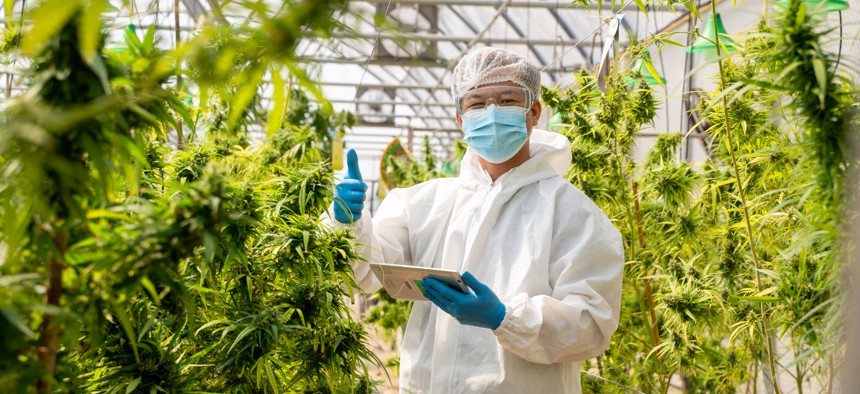States must lay tech foundation for cannabis growth

GettyImages/ Visoot Uthairam
As states legalize marijuana, they need scalable systems that can handle the complexities of licensing, product tracking and registering buyers and sellers – not just for medical use but for the recreational use that may follow.
As public demand drives more states and localities to legalize marijuana for medical and recreational purposes, the lack of standardization about licensing, tracking and tracing, and registering buyers and sellers is creating complexity.
“There is no cookie cutter that can be used in this,” said Greg Felix, vice president of strategic solutions sales at Accela, a cloud solutions provider. “Jurisdictions need to stay one step ahead and be much more sophisticated than was required, say, five [to] seven years ago.”
Recreational marijuana use is legal in 18 states and Washington, D.C.; 36 and D.C. have legalized medical use; and Forbes names several – Delaware, Maryland, Missouri, Ohio, Oklahoma and Pennsylvania – as possible candidates for legalization this year. In July 2021, three senators proposed removing marijuana from the Controlled Substances Act, and two months later the House Judiciary Committee approved a bill to decriminalize it, bringing federal oversight closer.
It doesn’t stop at the states, however. Accela is tracking about 91 jurisdictions nationwide with the ability to permit or license cannabis businesses. For instance, California, which legalized medical and adult use, lets localities opt in. Those that do need ordnances regulating how many businesses they’ll allow or how they’ll handle licensing, Felix said.
“The most important part, at least from a jurisdictional perspective, [is] in 2020, cannabis sales produced net new tax revenue of about $3 billion," Felix said. That came from only for a handful of states: Alaska, Arizona, California, Colorado, D.C., Illinois, Maine, Massachusetts, Michigan, Montana, New Jersey, Nevada, Oregon, South Dakota, Washington and Vermont, he said. Since 2017, the U.S. cannabis industry has averaged a 27.5% growth in job creation year-over-year and employs about 321,000 American workers.
Most states begin their cannabis legalization with medical use, which means they first set up a system – ideally, automated – to handle licensing businesses, registering approved consumers and tracking and tracing supply. Approval for adult use often follows, Felix said, but that relies on a separate set of requirements. Agencies need to think ahead and have a scalable system ready.
“Here’s the challenge: With the medical program, a lot of times they’re saying, ‘We can’t start thinking about this until we know for a fact that the legislation will pass.’ That’s a legitimate concern, especially now in the pandemic,” he said. “But the minute they see the tea leaves that this is going to pass … that’s the time you start thinking about it.”
Felix points to the work South Dakota is doing. Voters there approved medical use in 2020, and although the state supreme court blocked the legalization of adult use in November 2021, it may be on the ballot again this year. To meet regulatory needs, the state is using Accela’s cloud-based Cannabis Regulation ecosystem – essentially a preconfigured platform based on needs that have arisen with other Accela customers. It allows the state to process patient and caregiver card applications in addition to cannabis license applications.
When agencies stand up a solution only for medical use and try to then retrofit it for recreational, it often fails, Felix said.
“The proof is two years down [or] a year later in the program and are you seeing things like rampant, runaway, uncontrollable illegal market, breaches into the system, unhappy businesses, or in some cases extreme imbalance between supply and demand, which ultimately ends up creating terrible problems with the illegal market,” he said. For example, in Oregon a backlog of license applications in 2019 that halted processing until this month contributed to a surge in the number of illegal growers. Some farms use uncontrolled amounts of water, drying up water sources for legitimate businesses. Last month, the Legislature tagged $25 million to fight illegal marijuana farms.
And more complication is coming, Felix predicts, when federal legalization of cannabis passes, paving the way for interstate cannabis commerce. Governments can prepare now by incorporating technologies such as artificial intelligence and blockchain.
“There’s going to be a seismic shift,” he said. “Cannabis 3.0 is coming and there are going to be those who are not prepared for this.”
Stephanie Kanowitz is a freelance writer based in northern Virginia.





